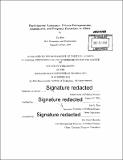| dc.contributor.advisor | Lily L. Tsai. | en_US |
| dc.contributor.author | Hou, Yue, Ph. D. Massachusetts Institute of Technology | en_US |
| dc.contributor.other | Massachusetts Institute of Technology. Department of Political Science. | en_US |
| dc.coverage.spatial | a-cc--- | en_US |
| dc.date.accessioned | 2016-03-25T13:37:05Z | |
| dc.date.available | 2016-03-25T13:37:05Z | |
| dc.date.copyright | 2015 | en_US |
| dc.date.issued | 2015 | en_US |
| dc.identifier.uri | http://hdl.handle.net/1721.1/101808 | |
| dc.description | Thesis: Ph. D., Massachusetts Institute of Technology, Department of Political Science, 2015. | en_US |
| dc.description | Cataloged from PDF version of thesis. | en_US |
| dc.description | Includes bibliographical references (pages 209-229). | en_US |
| dc.description.abstract | This dissertation addresses the puzzle of why individuals in authoritarian systems seek office in formal institutions, which are often dismissed as weak and ineffective. I argue that individuals seek office mainly to protect their property from government expropriation in China. In contrast to prior work, I argue that instead of being passive takers of existing institutional arrangements, private entrepreneurs in China actively seek opportunities within formal institutions to advance their interests. By holding seats in local legislatures, entrepreneurs signal to local bureaucrats that they have access to higher-level government officials to report illicit predatory behavior. This signal, in turn, deters local officials from demanding bribes, ad hoc taxes, and other types of informal payments. I deploy both qualitative and quantitative methods to support the argument. First, to understand state-business relations in China, I conducted 106 in-depth interviews with private entrepreneurs, government officials, and local scholars in five provinces during 16 months of fieldwork. I show that even while government expropriation is an endemic problem, private entrepreneurs who are also legislative officeholders are less likely to experience severe expropriation. Second, using a nationally representative survey of private entrepreneurs, I quantitatively show that entrepreneurs who have seats in the local legislatures on average spend 25 percent less on informal payments to local officials compared to entrepreneurs without such a political status. To investigate the causal link between formal office and protection of property, I conducted field experiments on Chinese bureaucrats to understand how local bureaucracies respond to constituents with connections to formal institutions. These experiments involved directly contacting officials to examine how they respond to realistic messages from citizens. Using an experimental manipulation, I demonstrate that Chinese bureaucrats are 35 percent more likely to respond to a constituent with connections to formal institutions. These findings challenge prominent theories of authoritarian politics, which see authoritarian institutions as instruments to arrange power sharing, rent distribution, or information collection. Adopting an "institution as resource" perspective, I show that within authoritarian institutions, entrepreneurial actors can seek opportunities to advance their interests and improve their well-being through formal means, even when these formal institutions are relatively weak.. | en_US |
| dc.description.statementofresponsibility | by Yue Hou. | en_US |
| dc.format.extent | 229 pages | en_US |
| dc.language.iso | eng | en_US |
| dc.publisher | Massachusetts Institute of Technology | en_US |
| dc.rights | M.I.T. theses are protected by copyright. They may be viewed from this source for any purpose, but reproduction or distribution in any format is prohibited without written permission. See provided URL for inquiries about permission. | en_US |
| dc.rights.uri | http://dspace.mit.edu/handle/1721.1/7582 | en_US |
| dc.subject | Political Science. | en_US |
| dc.title | Participatory autocracy : private entrepreneurs, legislatures, and property protection in China | en_US |
| dc.title.alternative | Private entrepreneurs, legislatures, and property protection in China | en_US |
| dc.type | Thesis | en_US |
| dc.description.degree | Ph. D. | en_US |
| dc.contributor.department | Massachusetts Institute of Technology. Department of Political Science | |
| dc.identifier.oclc | 941248376 | en_US |
